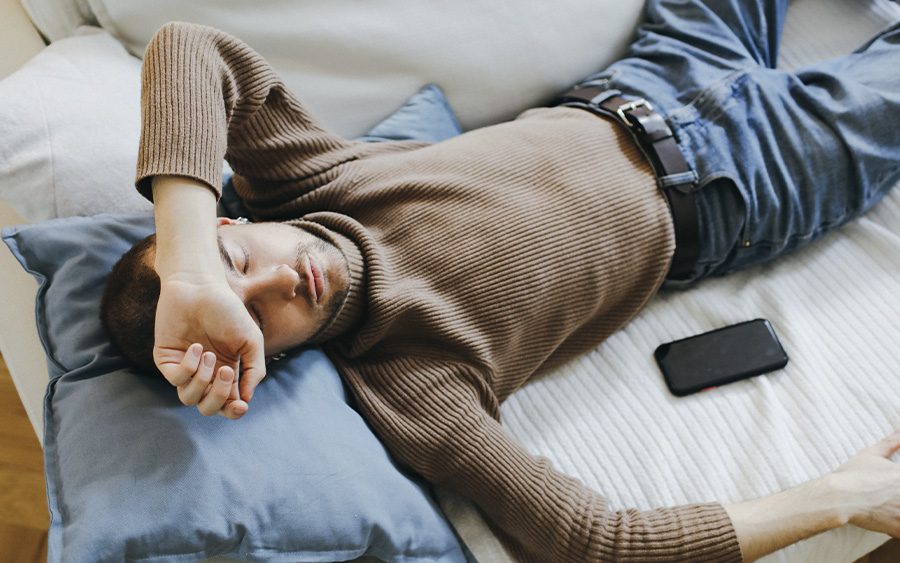Feeling exhausted more often? Wondering if depression makes you feel tired? You’re not the only one. Find out how depression impacts your energy levels and sleep patterns.
When we think about depression one image that often comes to mind is a tired, exhausted body, struggling to get out of bed. Or a slow-moving person dragging an heavy tiredness that overshadows every experience, every interaction, much like Eeyore’s rainy cloud (the donkey from Winnie the Pooh).
For people with depression, feeling tired is a constant and familiar presence. So much so, that sometimes it is even difficult to detect or recognize, much less, understand.
Depression can be a direct cause of fatigue. But it also can exacerbate it by interfering with our sleep, eating habits, exercise, and stress levels. All of which help drain us of the remaining energy we have left.
So, the first step to tackling these feelings of exhaustion and lack of energy is to have a better understanding of your experience of depression and tiredness.
Are You Depressed or Just Tired?
“I feel tired all the time, does this mean I have depression?”. While fatigue and depression go hand in hand, just because you feel tired doesn’t necessarily mean you have depression.
Both depression and fatigue share symptoms like low energy, low motivation, and chronic tiredness. However, one major difference can help us distinguish the two: people with fatigue want to do things, but lack the energy. Whereas people with depression lose interest altogether.
Another distinction can be the duration of the low mood and whether or not it improves with sleep. Usually, a good night’s sleep can do a lot for a tired person’s mood. However, this can be a challenging task for someone with depression.
Depression Affects Your Ability to Sleep
Many people struggling with depression have trouble falling asleep and sleeping through the night. Research tells us that about 80% of people with depression suffer from insomnia. This results in a lot of restless and non-restorative nights.
Plus, depression often comes with menacing behaviors that disrupt sleep. Such as taking naps during the day, staying in bed or on the couch for long periods, and not being physically active. Which will make falling asleep at night even harder.
However, lack of sleep is not the only cause of tiredness. Have you ever slept past your usual hours and woke up feeling low energy? Oversleeping is also a common pattern in depression and can cause signs of fatigue over time.
Depression also Affects Your Sleep Quality
When you are depressed you might wake up feeling tired, even with seven to nine hours of sleep each night. This is because clinically depressed people have aggravating factors that impact sleep quality:
- Taking more time to fall asleep.
- Frequently waking up during the night (which disrupts the sleep cycle).
- Less deep sleep.
- Waking up early or in the middle of the night, and struggling to fall asleep again.
Depression Highjacks Your Energy
Do you feel more tired after a day in the sun, or at the beach? Want to know why? This happens because our body spends all day using resources to cool down. Much like this, when we have depression our body is constantly fighting to stabilize our mood, trying to overthrow our negative thought loops.
It’s not only your body that consumes energy. Your brain also needs it. Actually, the brain burns 20% of the energy we use. The problem is when depressed, we tend to ruminate, overthink, and immerse ourselves in negative thoughts and emotions. This can be a burdening process for our brain, which also impacts our physical health.
Moreover, things that require little effort in a healthy state can become real challenges when we are depressed. For example, getting out of bed, eating, going to work or college, engaging in an activity, or social interaction. Every day we struggle and push ourselves to do these things that we don’t feel like doing. This requires a massive mental effort.
Treatment for Depression in Baltimore, MD
Have you been feeling tired, exhausted, with low energy? Do you think you might be depressed? Are you looking to help a loved one that is struggling with depression?
While depression is one of the most common causes of feeling tired and fatigued, it’s not the only one. So, it’s important to seek a mental health professional that can help you understand these symptoms, and work with you to regain your energy and motivation. Our team of therapists at New Connections Counseling Center will help you overcome fatigue, depression, anxiety, and other life challenges you might be facing. Reach out to us!






